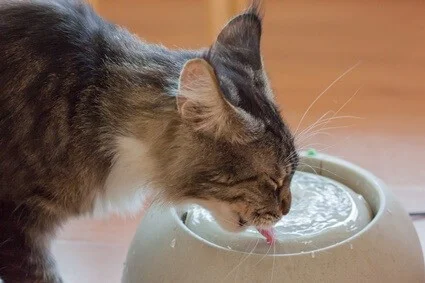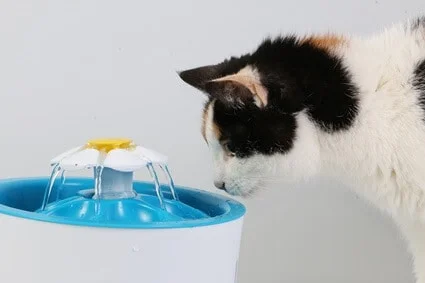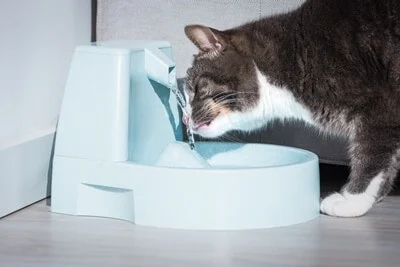The average 10-pound cat needs to drink 7-9 ounces of fresh water per day to normalize its body temperature, digest food, remove waste, and prevent dehydration. However, cats will be more reluctant to drink if it causes retching.
If your cat chokes after drinking water, it may have drunk it too quickly. Also, check the water isn’t too cold, as it’ll be harder to swallow. Your cat may have eaten too much food before drinking, and there wasn’t enough room in its stomach. Perhaps your cat’s collar’s on too tightly, or it has an allergy to a plastic drinking vessel.
If your cat keeps retching after hydrating, it won’t want to drink because it’ll associate doing so with discomfort. A cat that’s not drinking water could die within 3-4 days unless it’s able to hydrate sufficiently frequently.
Why Does My Cat Gag After Drinking Water?
Here are the reasons why a cat chokes after drinking water:
Drinking Too Fast
Cats have small stomachs and can only store so much fluid at a time. What’s more, cats are more accustomed to sipping water than lapping up substantial quantities of water.
There are reasons why a cat feels compelled to drink quickly, including the following:
- Stress – The cat wants to drink and run as it feels vulnerable.
- High body temperature – This is caused by ambient heat or exercise.
- Too much salt (sodium) – Saly disrupts the fluid balance in the cells.
Offer your cat multiple water sources around the home, and review the ingredients of any food or treats you offer a cat. If what you feed your cat is high in sodium, it’ll be excessively thirsty.
Drinking to Excess
Drinking to excess has almost identical causes to a cat drinking water too quickly. The cat will keep returning to the water bowl, eventually becoming unable to hold any more water in its stomach.
Common illnesses linked to excessive thirst in cats include:
- Urinary tract infections
- Diabetes
- Hyperthyroidism
- Renal failure
- Hypercortisolism (Cushing’s disease)
Cats frequently don’t drink enough water, so you’ll soon know if your cat’s hydrating to excess.
Scent or Taste Issues
Water has a reputation for being tasteless, but this isn’t the case for cats.
Felines can taste hardness in tap water and cleaning agents, such as chlorine. As explained by the Journal of the Autonomic Nervous System, this activates a cat’s vagal neurons.
The vagus nerve sends constant messages to the brain that govern reactions, including gag reflexes and coughing. If your cat dislikes a taste or smell, the brain will reject the source, and tap water is a common reason for this reaction.
If your cat regularly gags on tap water, switch to a different hydration source. Bottled water will be expensive, while a water purifier is cheaper and eco-friendlier. If this doesn’t help, consider changing the location of your cat’s water.
Water may be too close to a food source or litter tray, and the aroma of food or waste will taint the water from a feline perspective. Gagging will inevitably follow, assuming the cat can bring itself to drink at all.
Water Too Cold
Ice cold water can be refreshing on a hot day, but cats like their water close to room temperature. If water is too cold, your cat will struggle to swallow it, resulting in gagging.
Full or Empty Stomach
The fluid may be rejected if a cat drinks on a full stomach.
Equally, a hungry cat may gag when drinking as the stomach expected solid sustenance and rejected water.

Foreign Objects in Water
If your cat starts to choke after drinking, you may find foreign objects floating in the liquid.
If you cannot see anything in the water, it doesn’t mean there was no foreign object. The cat may have swallowed the item, or worse still, got it trapped in the throat. Open the cat’s mouth and check for any obstructions.
Pre-existing Throat Obstructions
Your cat may have an existing obstruction in its throat that’s preventing water from reaching its destination. Once the water reaches the obstruction, it’s immediately expelled.
Check your cat’s throat for any obstructions. Gently hold the mouth open and shine a torch. If the cat has an obstruction in the throat, a vet must resolve this.
Hairballs
Hairballs are the most common obstruction of the feline throat., especially among longhaired breeds.
Hairballs occur when a cat grooms itself and, in doing so, it’ll remove clumps of hair that would ordinarily be shed. These will make their way into the mouth and may become trapped in the throat.
Undigested Food
Your cat may have failed to swallow all of its meal, which is most likely to happen with kibble and dry food. Consequently, these can get stuck in the throat or roof of the mouth.
This commonly affects cats with bad or broken teeth because chewing is painful, so they swallow without sufficient mastication. The cat is struggling to break down hard food.
Bones
If you offer your cat butcher’s meat, ensure that it’s completely deboned. Small bones, especially chicken and fish bones, can become trapped in a cat’s throat.
Tight Collars
If you fir your cat with a collar, ensure it fits properly. Measure your cat’s neck before purchasing one and check for changes in size over time. A tight collar will choke your cat, making swallowing water and food more difficult.
The golden rule is to ensure that you can slip two fingers under the collar. This means that the collar is tight enough to stay on but not restrictive. Anything snugger than this can make it hard for your cat to swallow water.
Polyps and Tumors
Growths can develop in the nose, ears, and throat, making it hard for cats to swallow water.
The Journal of Small Animal Practice details two cases in which a nasal tumor led to a narrow trachea. Tumors and polyps can be long and interconnected, and not all growths that cause gagging on water begin and end in the throat.
Scans and X-rays at a veterinary practice will reveal if your cat has a polyp or tumor.
Poor Heart Health
Gagging after drinking water could be due to a health concern, such as
Hypertrophic Cardiomyopathy
The Journal of Veterinary Cardiology stated that hypertrophic cardiomyopathy impacts 15% of cats that appear healthy. Unfortunately, this condition rarely leads to visible symptoms.
Hypertrophic cardiomyopathy causes the muscles around a cat’s heart to thicken and harden, making it harder for blood to pump around the body. This makes it difficult to swallow water and absorb it into the bloodstream.
An echocardiogram will reveal any significant issues.
Respiratory Infection
A feline respiratory infection could be due to Feline Herpesvirus (FHV) or Feline Calicivirus (FCV).
When a cat has a respiratory infection, the symptoms are similar to humans: lethargy, streaming from the eyes and nose, and coughing and sneezing. Also, the cat must drink plenty of fluids.
A cat’s coughing or sneezing won’t cease just because it’s drinking. This means that your cat may experience gagging or choking while hydrating.

Allergies
When a cat sneezes when drinking water, allergies are likely responsible. Unfortunately, cats can develop allergies at any point in their life, and these sensitivities can arise very suddenly.
In addition to gagging, wheezing, and sneezing, check for excessive scratching after your cat drinks. If you observe this, check your cat’s skin. If it’s covered in hives and hotspots, an allergy is likely to blame.
It’s possible, but unlikely, that the water itself is causing the allergy. Your cat may have developed a sensitivity to a chemical found in tap water. If this is the case, switch to bottled or filtered water.
Many cats have an aversion to plastic, so change to a ceramic or porcelain drinking bowl.
Determining a cat’s allergy is a matter of trial and error. Once you have identified what sparks the reaction, remove any exposure. In doing so, you’ll find that your cat’s symptoms will quickly subside.
Cat Drinking Tips And Advice
To enable your cat to drink water freely, you should:
- Use a safe, non-allergenic drinking vessel or water fountain
- Offer filtered/bottled water rather than tap water
- Ensure the water is at room temperature
- Keep any belled collars or flea collars sufficiently loose
- Encourage the cat to drink after small meals
- Avoid feeding your cat a diet that’s high in salt
- Avoid food competition by feeding cats separately
A cat gagging and choking after drinking water is sometimes a one-off. However, if it becomes a regular occurrence or gagging or choking repeats for 24 hours or more, your cat should be examined by a veterinarian.

